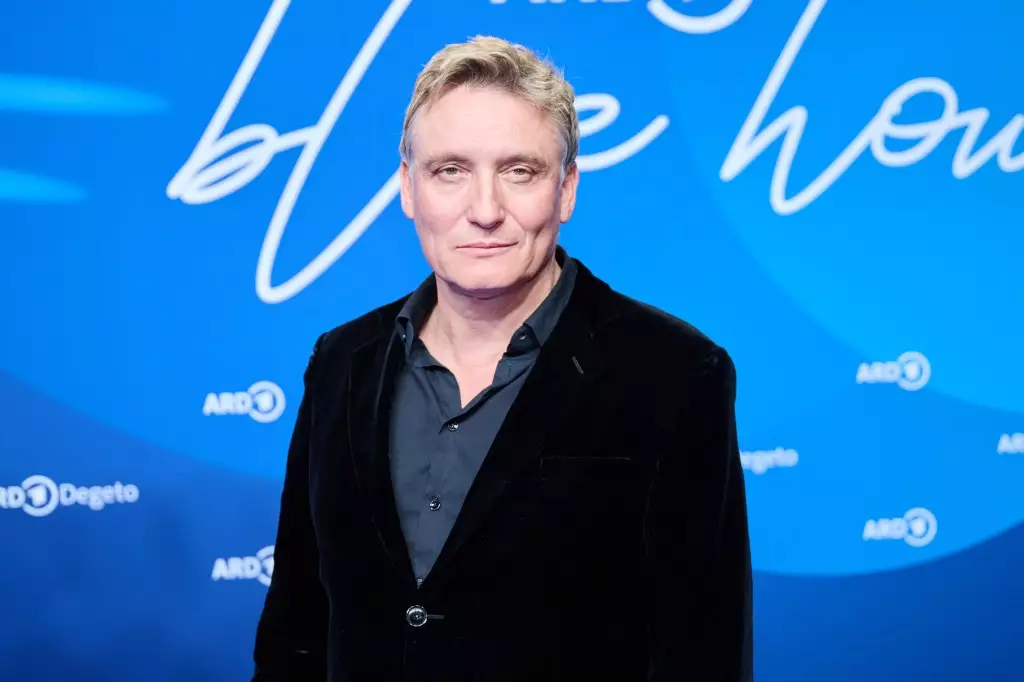The experience of filming a series like “The German” can be daunting under the best circumstances, but for lead actor Oliver Masucci, the challenge was magnified by the real-world chaos of the Israel-Hamas conflict. While portraying the complex character of Uri—a Holocaust survivor involved in the search for the notorious war criminal Josef Mengele—Masucci found himself in an emotionally charged environment that transformed the set into a backdrop of tension and fear. With rockets raining down and mandatory evacuations into bomb shelters, the production was not only a showcase of art but an exercise in resilience and determination in the face of adversity.
“I felt ‘co-traumatized,'” Masucci confessed, highlighting how deeply the events outside the set bled into the narrative he sought to create. The intersection of a fictional quest for justice and the harsh realities of life in a war-torn region speaks volumes about the psychological toll on those involved. When the stakes are no longer just about a character but also about the survival of a community—a backdrop of conflict that resonates globally—the acting becomes not just a profession but a responsibility laden with profound emotional implications.
A Dual Journey: Personal and Professional
Uri’s character encapsulates a tumultuous internal struggle: the desire to escape the terrors of the past while grappling with the faded memories of trauma. For Masucci, this dual narrative not only became a performance challenge but also mirrored his own psychological battles amid ongoing hostilities. “I tried to stay focused on succeeding in playing this role in Hebrew,” Masucci reflected, emphasizing how the act of embodying Uri transformed into an act of personal protest against the very realities surrounding him. Instead of succumbing to despair, Masucci infused hope into his character, which became a cathartic outlet for his own fears and frustrations.
The shoot became a shared experience of camaraderie; crew members developed coping mechanisms—a paradoxical mix of humor and defiance—to navigate their collective anxiety. “Don’t open the news, open a bottle of wine,” was not only a piece of advice but a mantra that unified them through hardship, allowing them to weather the storm together.
A Unique Take on Historical Narrative
Set against the backdrop of post-World War II, “The German” offers viewers a complex narrative that dives into the dark traumas of history while asking critical questions about justice and morality. Masucci’s character is unlike traditional portrayals of Holocaust survivors; he is neither a passive victim nor simply a seeker of vengeance but a multidimensional survivor attempting to navigate the murky waters of his own moral obligations and trauma. The storyline’s intersection with the Israeli-Palestinian conflict serves as a poignant reminder that the struggles wrought by war are often cyclical, pushing narratives of retribution and justice to the foreground.
The creative prowess behind “The German”—a team renowned for their ability to weave intricate tales like “Fauda” and “Tehran”—provides an opportunity to rethink how historical narratives can reshape modern dialogues. Rather than merely relegating the Holocaust to a time-bound history lesson, this series incarnates the past’s lingering presence in contemporary conflicts, forging connections that speak volumes for both personal healing and societal reckoning.
Language as a Barrier and Bridge
One of Masucci’s significant challenges while preparing for his role was learning Hebrew, a task he initially deemed impossible. Struggling to overcome linguistic hurdles, he employed a process of transliteration that he described as a “double transformation.” Such challenges often characterize actors’ journeys into roles that demand authenticity and nuance, yet they can also serve to deepen the connection with the character’s plight. Masucci’s engagement with Hebrew is reflective of the complex interplay between language and identity—how the words we choose can help convey an entire universe of emotion and intent. Language becomes a vehicle for both understanding and misunderstanding; for Masucci, it represented a grudging acceptance of his own limitations and the depth of the character he aimed to portray.
His ability to overcome these challenges speaks not only to his skill as an actor but also to his dedication to honoring the story he was tasked with telling. The personal investment in learning a new language becomes symbolic of his commitment to a story larger than himself—a reflection of collective struggle and shared human experiences.
The Impact of “Dark” on Masucci’s Career
Masucci’s breakout role in “Dark,” a German sci-fi thriller, disrupted the traditional landscape of international television and paved the way for greater opportunities beyond his native Germany. He acknowledges this, noting that the show has opened doors, allowing him to partake in global narratives that resonate with diverse audiences. This cultural shift emphasizes how interconnected the world has become, showcasing the appetite for storytelling that transcends barriers of language and geography.
The actor’s enthusiasm for his role in “The German” reflects a growing awareness in the industry of the profound impact of storytelling. The series not only pays homage to the past but also aims to spark dialogue about significant societal issues. By engaging in these complex narratives, Masucci and his team stand at the forefront of an evolving medium, reminding viewers that art can provoke thought, elicit empathy, and, potentially, influence change.
